Credentialing healthcare providers is no easy task. It requires time, money, and much attention to detail. It’s no wonder that many healthcare organizations struggle with this process, as their revenue often depends on it. Credentialing systems and processes must be smooth and efficient to avoid hiccups that can delay a provider’s ability to see patients and get paid.
This is where healthcare credentialing software comes in. The best software will help automate and streamline the healthcare credentialing workflow, reducing your team’s workload and getting providers approved to practice faster.
In this guide, we’ll explore the best healthcare credentialing software on the market today to help you find the right solution for your organization.
Importance of Healthcare Credentialing


1. Building Patient Trust through Credentialing
Credentialing matters because it instills confidence in patients. Your patients’ state of mind plays a significant role in the healing process. Patients who trust their physicians can feel better about following doctors’ orders, from changing diet and exercise to trying a new medication or undergoing a procedure.
Of course, patients confident in their doctors will also be more likely to stay with the practice and won’t be looking around for a more competent physician. Having fully medically credentialed nurses and doctors makes your organization more appealing to other employees, including new physicians, PAs, LVNs, RNs, nurse practitioners, and support staff.
They’ll want the prestige that comes from knowing colleagues are all well-trained and up to speed on the latest in the medical industry. By highlighting your team’s outstanding abilities, you encourage future excellence.
2. Demonstrating Professionalism in Healthcare
Credentialing establishes your professionalism in a healthcare setting, with irrefutable documentation. Taking the time to fill out paperwork required to show your credentials is a small price to pay for assuring patients of your bona fides. Healthcare Innovation noted, “Through a standardized process involving data collection, primary source verification and committee review by health plans, hospitals and other healthcare agencies, patients are assured of their healthcare professional’s merit and experience.”
In the past, medical professionals may have balked at credentialing because of all the paperwork they’d have to wade through. However, modern methods allow much of this information to be handled online. Check that your team can use electronic credentialing for any entities that want to check your standing, such as before you start a contract with another organization or before any hospital can allow you to become an affiliate.
Details to provide include where you went to medical school, the location of your internship or residency, your board certifications, and your curriculum vitae. Of course, you’ll also note information about your malpractice insurance and your current, valid medical license.
3. Credentialing is Required for Compensation
You’ll need to be medically credentialed, as this is required for reimbursement from insurance companies. Getting the documentation finished promptly ensures that a new nurse or doctor I’ve hired can begin providing services on hiring day. To that end, many organizations will require applicants to have their documentation set up well beforehand.
It’s not a task to put off, and the time frame can vary from state to state because of differences in regulations and credentialing laws. Private health insurance companies, Medicare, and Medicaid will want proof of medical credentialing before allowing your staff to engage with patients.
4. Credentialing Cuts Down on Medical Errors
When healthcare professionals obtain proper medical credentials, it helps to support the safety and security of the entire industry. Medical errors are implicated in 98,000 deaths in America (per Healthcare Innovation’s report), making the importance of medical credentialing clearer. Patients have a right to trust that their healthcare providers know what they’re doing and are working in a safe and approved fashion.
5. Credentialing Can Help Ensure Adequate Staff Levels
If you’ve been having problems maintaining the requisite staff levels to serve your local community, medical credentialing is essential to filling out your team. New medical staff candidates who aren’t coming from a job placement company (that would help them with credentialing) should get started with medical credentialing as early as possible. It could take as many as four months to complete.
To help pave the way, create resources such as a credentialing packet to give to all new hires. It will support them through the application process. Your human resources department would be well advised to track the status of all candidates’ medical credentialing to identify any obstacles that could delay onboarding new hires.
Related Reading
13 Tips for Efficient Healthcare Credentialing


1. Use Azulity for Smooth Credentialing Processes
Azulity specializes in healthcare master data management and provider credentialing services, bringing proven expertise in implementing healthcare data solutions and credentialing across the US. Our comprehensive platform ensures consistent patient, provider, location, and claims data synchronization across all systems and departments.
Key features include: healthcare MDM, provider MDM, reference data management, credentialing, and provider enrollment. We serve healthcare technology leaders – from CIOs and CDOs to VPs of data platforms and credentialing – helping them eliminate the costly problems of fragmented data systems. Book a call to learn more about our healthcare master data management services today!
2. Start the Licensing Process Early
For new practitioners, starting the licensing process as soon as possible is critical for a flawless transition from educational programs to practicing. Different licensing processes apply to other providers, and each can take a different time to complete.
For example, PAs (Physician’s Assistants) must obtain certification from the National Commission on Certification of Physician’s Assistants. This certification process can involve several steps, including verifying education and citizenship, and may require peer references.
3. Keep All Physician Contact Information Up to Date
Something as simple as a provider’s or peer reference’s wrong address can cause problems with medical credentialing. Therefore, ensure that all contact information for physicians or other providers is updated periodically. If clear lines of communication are unavailable for any given provider, this can slow down processes when a payer questions a provider’s credentials.
4. Outsource Medical Credentialing Services
Medical credentialing can be a time-consuming process. Additionally, slight missteps in the process lead to frustrating issues later. Therefore, working with a medical credentialing service provider like PrognoCIS may be one of the best credentialing tips you can follow.
When you outsource provider credentialing with a service like PrognoCIS, a medical credentialing specialist assesses the credentials on file for providers within the organization and ensures everything is recorded correctly.
5. Know Your State’s Regulations
State regulations for medical professionals can vary in terms of credentialing. This is especially important if your organization has providers transitioning from one state to another to provide services. If credentials for that specific state are not updated, this can lead to problems once claims are filed to receive payments from payers for services rendered.
6. Track Credentialing Applications
Track their progress once credentialing applications are submitted to an insurance company or organization. Don’t hesitate to check in with an insurance company to find out where an application is in the acceptance process. It is not uncommon for payers to set aside applications that are missing information and delay alerting providers promptly.
7. Avoid Common Errors
As simple as it sounds, an essential medical credentialing best practice tip is to be mindful of common errors. Standard errors are most likely to disrupt the credentialing process with a provider. Physician’s Practice states that as many as 85 percent of credentialing applications are missing must-have information that the payer needs to process the application. This can include:
- Lack of peer reference contacts or contact information for those contacts
- Improperly filled-out credential forms or missing information
- Submitting an expired NPI or DEA number
- Missing gaps in malpractice history
- Lack of clinical history documentation
- Data entry typos or mistakes
8. Keep Digital Files
Hard copies of credentialing files are essential, but keeping at least one digital file where all credentialing documents can be stored is just as vital. This is a crucial medical credentialing best practice to remember because it can save time later. When a payer requests credentials, you will have one transparent file where everything is digitally available. Be sure to include diplomas, state licenses, DEA documents, passports, driver’s licenses, and anything else used for credentialing experience or identity.
9. Obtain a Dedicated DEA Number
DEA (Drug Enforcement Administration) numbers are mandated for providers to prescribe medication. Providers typically need a number for each state where they intend to provide services, but requirements vary. It can take several weeks for applications for DEA numbers to be processed after applying through the DEA website.
10. Get an NPI Number
National Provider Identifiers (NPIs) are assigned to care providers, but the provider must also ensure to keep NPI information current. If a provider does not have an NPI or their information is not accurate, this is a common reason for the claim to be denied by payers. Therefore, any time a practitioner’s status changes, the National Plan and Provider Enumeration System (NPPES) must be updated through the NPPES website.
11. Request Procedure Logs & Clinical History
Clinical history is a common requirement for proof of work history in healthcare. To prove clinical history for any provider, request procedure or activity logs and keep them on file. Whichever department is responsible for billing for a provider’s services can usually offer an activity log that can be used for clinical history documentation.
12. Examine Malpractice Claims
An extensive record of previous claims filed, records of insurers, and policy numbers for malpractice insurance should be kept on file with credentialing information. Make sure new providers have a certificate of insurance on file as well.
13. Track Progress Using Advanced Software for Monitoring
A provider’s credential file can involve licenses, numeric identifiers, and identification forms with expiration dates. If these documents expire without notice, this can generate problems with credentialing. Be sure to track expiration dates on each provider’s credentials in the organization. This ensures that documents soon to be out of date are updated promptly without disruptions.
15 Best Healthcare Credentialing Software
1. Azulity – Pioneering Healthcare Master Data Management and Credentialing
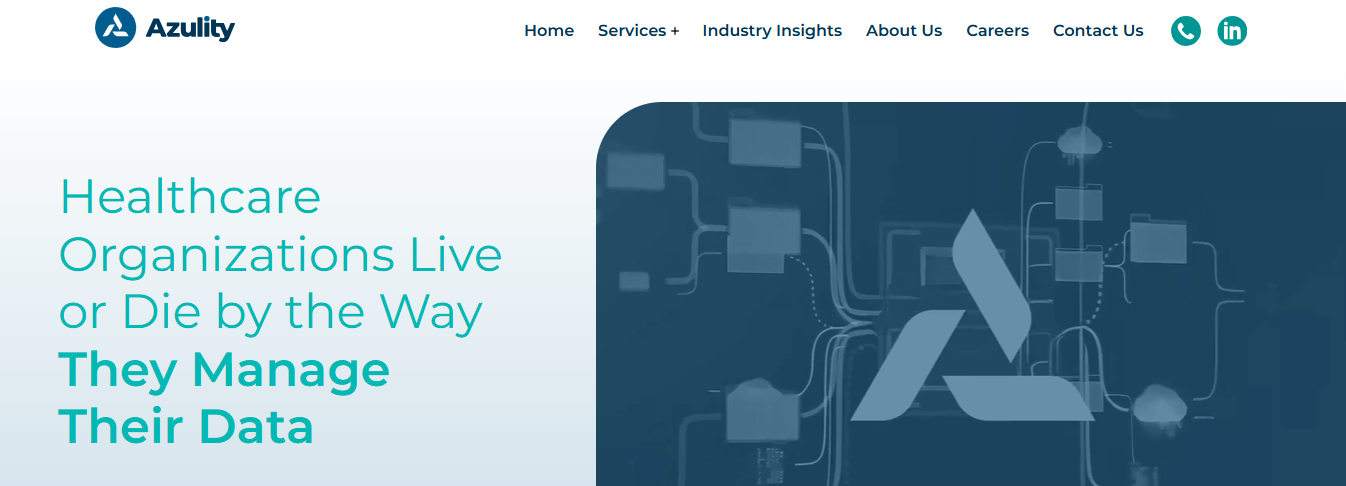

Azulity offers a comprehensive platform specializing in master data management and provider credentialing services, helping healthcare organizations eliminate the costly constraints of fragmented data systems. The platform consistently synchronizes patient, provider, location, and claims data across all systems and departments.
Key features include healthcare MDM, provider MDM, reference data management, credentialing, and provider enrollment. Azulity serves healthcare technology leaders, from CIOs and CDOs to VPs of data platforms and credentialing.
2. MediBillMD – Personalized Credentialing Solutions for Healthcare Providers
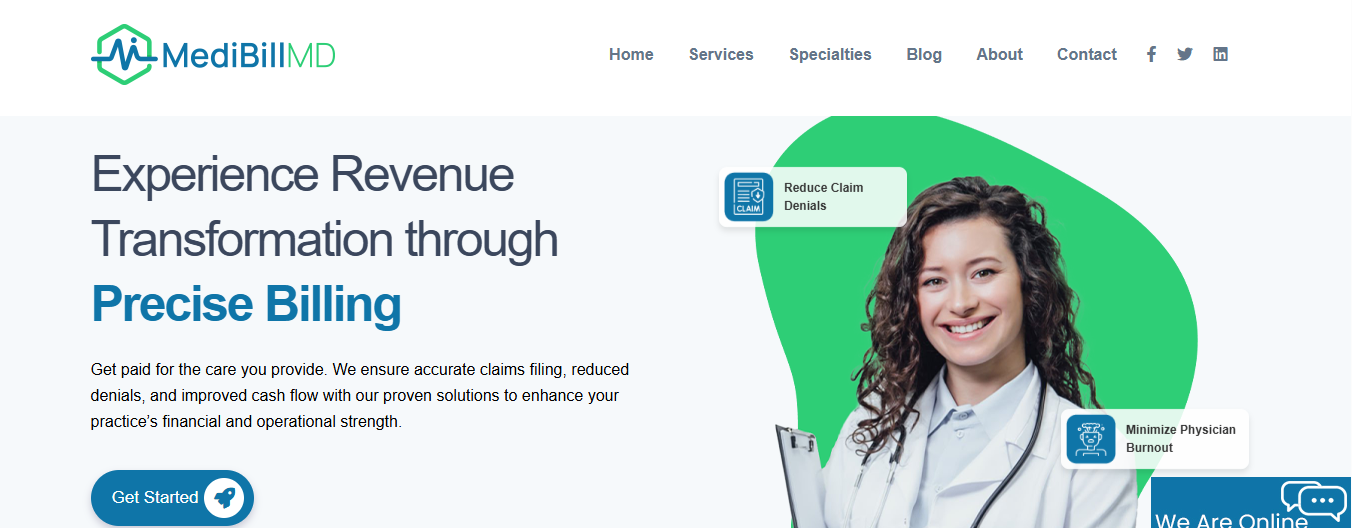

In Dallas, Texas, MediBillMD offers personalized medical credentialing services to healthcare practices and physicians across 45+ specialties. The company’s proven solutions have earned it a reputation as one of the best medical credentialing companies in the industry.
MediBillMD’s credentialing team follows a structured process from information gathering to contract negotiation to ensure successful enrollment in top insurance payers like Medicare, UnitedHealth, and Cigna networks. The company is HIPAA-compliant and ISO-certified to safeguard your personal information during credentialing.
3. Modio Health – Credentialing Solutions Built for Healthcare Professionals
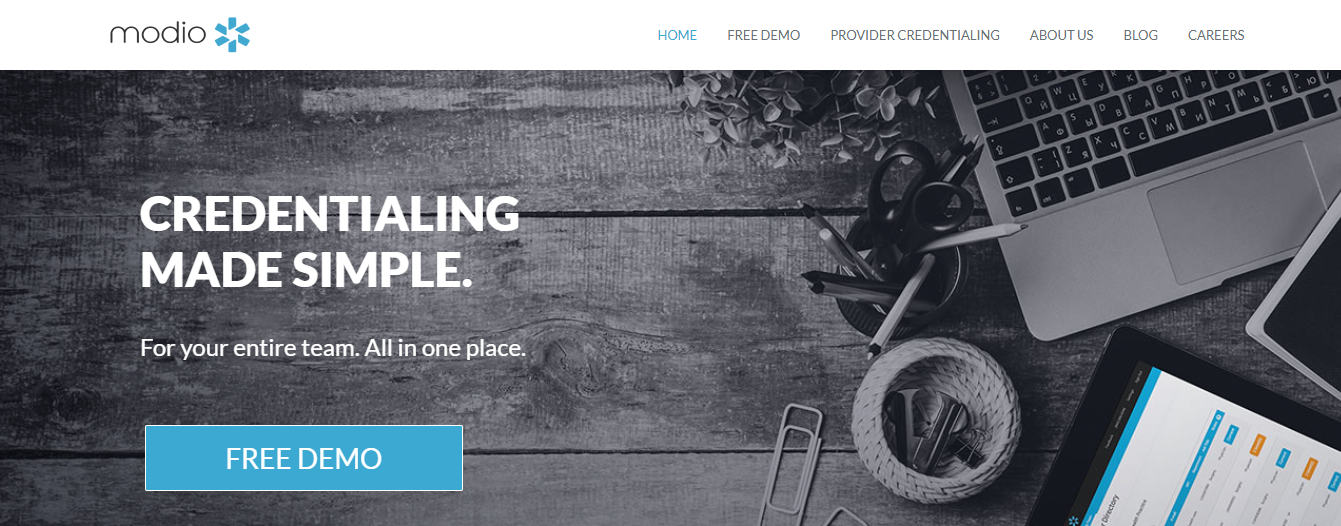

Modio Health has credentialing software developed by physicians and credentialing experts. It automates the healthcare credentialing process so physicians and other professionals can focus on patient care.
The platform is intuitive and easy for your entire team of medical professionals to use. Modio Health OneView pulls data from public services and primary source verification to collect provider details like education, license numbers, DEA, NPI, and more, helping you to stay compliant.
4. Bikham Healthcare – Fast Medical Credentialing for Laboratories
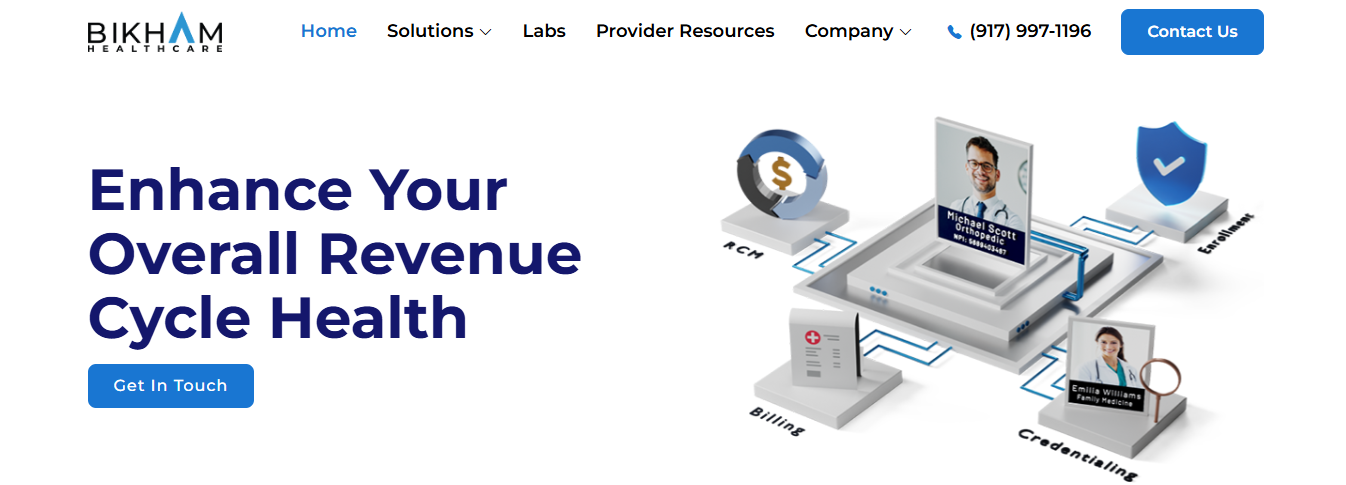

Bikham Healthcare is a New York-based revenue cycle management (RCM) firm offering a range of medical billing and coding services to over 500 clients in the USA. The company was formed in 2006 and has expanded to 4 global offices, 150+ employees, and 15+ specialties. Now, it is an established leader in laboratory billing services.
Their medical credentialing services include network research, application filing/ follow-up, appeals for closed networks, information updates, annual credentialing, and maintenance of PECOS and CAQH profiles. With Bikham Healthcare, you get credentialed by private and government insurance payers in no time.
5. Our Records – Streamlined Credentialing and Compliance Management
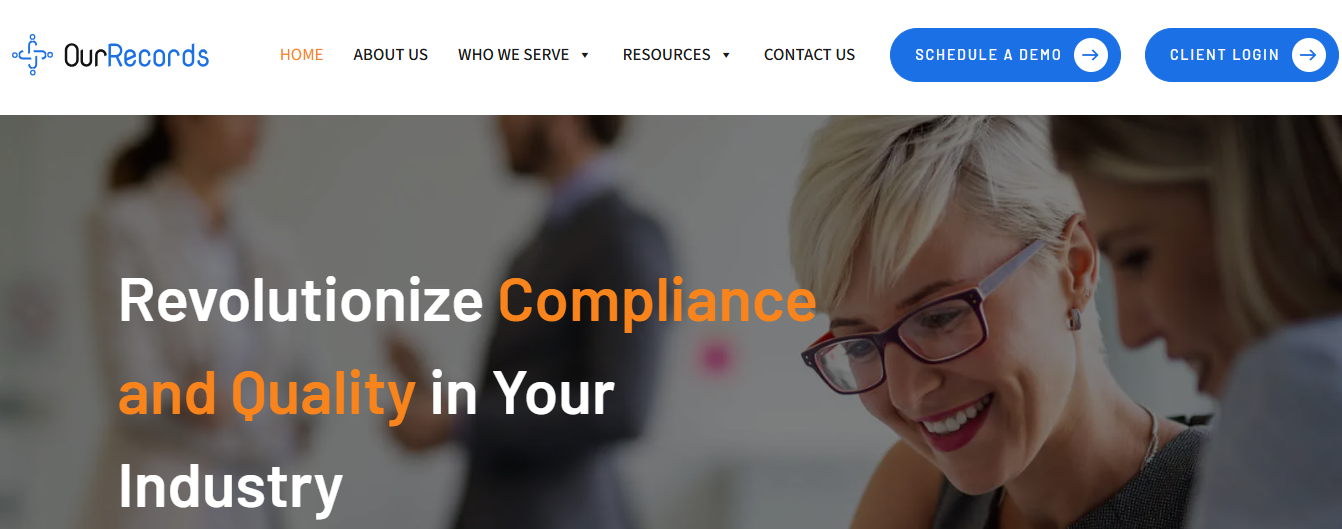

OurRecords is a cloud-based credentialing and compliance management solution that allows businesses to store, manage, and enable access to verified credentials and records. The software manages data for a business’s team members, vendors, and partners in one centralized location. Supplier and vendor records like W9s, state registration, and other compliance documents can be automated through OurRecords. Groups with unique requirements and credentialing objectives can customize the system.
6. Neolytix – Comprehensive Medical Credentialing Solutions for Practices
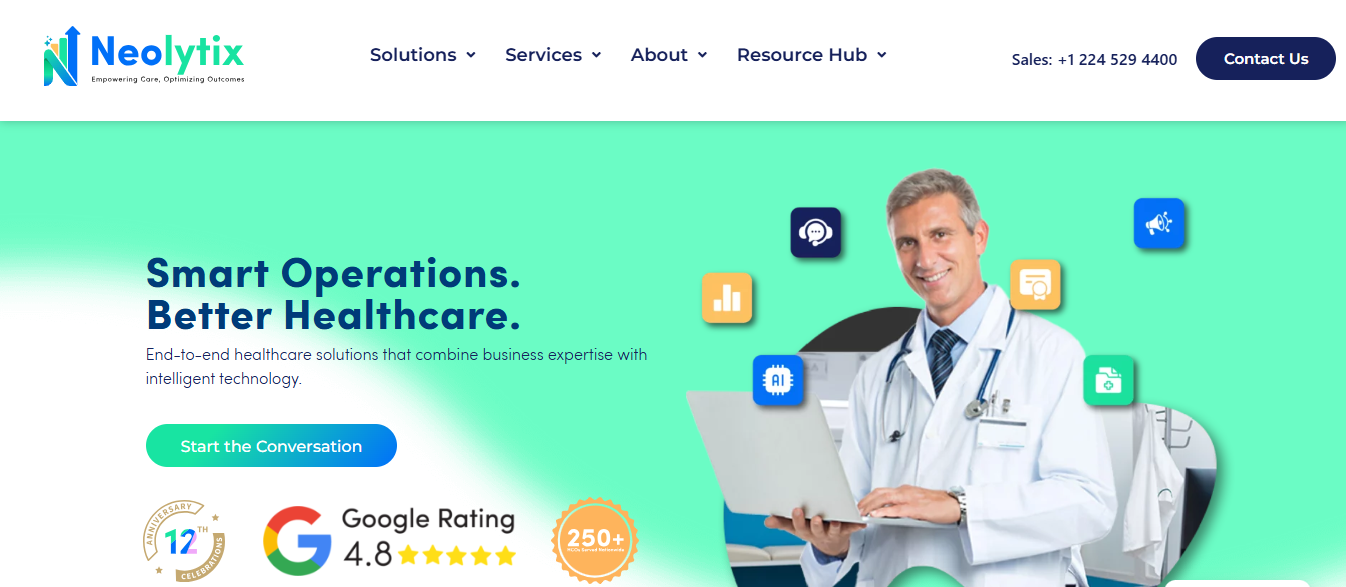

Represented by its cute mascot Doctopus, Neolytix offers remote non-clinical support to private healthcare practices and physicians. It positions itself as the No.1 management services organization (MSO) solutions provider for healthcare organizations. Neolytix, operating from Chicago, Illinois, excels at medical credentialing and enrollment. It handles information verification, application filing, payer contract negotiation, real-time updates, and re-credentialing on behalf of its clients.
7. MD-Staff – Credentialing Software for Efficient Provider Management
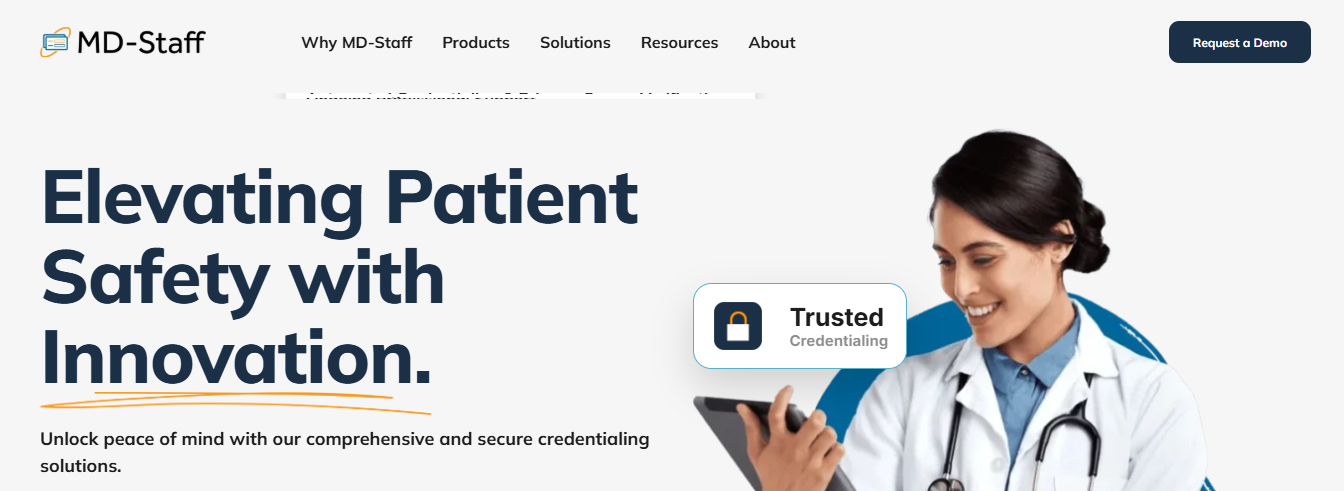

MD-Staff, the healthcare credentialing software by Applied Statistics & Management, makes everything from daily tasks to logging CME (Continuing Medical Education) hours easier for medical professionals. The software can store nearly any piece of provider information. Batches of data, like checklists, alarms, and customized workflows, can be developed for individual providers. The tool’s reporting system offers an expansive library of built-in reports, including expiration dates for license, insurance, board certification, and reappointment information.
8. Capline Healthcare Management – A Trusted Name in Medical Credentialing


Capline Healthcare Management is an A+ rated, accredited business by the Better Business Bureau. Therefore, it is worth mentioning in our top credentialing companies list. The company was founded in 2016 in Houston, Texas. Since then, it has managed the revenue cycles of more than 650 clients, helping them achieve near-zero denials in the cut-throat healthcare sector.
Capline’s medical credentialing solutions range from Health Maintenance Organization (HMO)/ Preferred Provider Organization (PPO)/ Medicare credentialing to fee negotiation and re-credentialing. And services like demographic updates and insurance portal creation are included in the price.
9. Kareo – Credentialing Solutions for Independent Medical Practices
Kareo focuses specifically on the credentialing process for independent medical practices. The system is designed to handle many tasks, from writing notes and prescriptions to supporting your in-house billing process. It offers enhanced EHR (electronic health records) functionality. The software can also support your insurance billing system and even help with marketing to promote your practice online and make it easier to find.
10. Billing Advantage – Experienced Medical Credentialing Services
Right from the southwestern tip of North Reading, Massachusetts, Billing Advantage delivers medical billing excellence to over 300 clinicians in 22 states. The company was formed in 2004 and employs billers and coders with more than 20 years of experience in the field. Under the umbrella of medical credentialing, Billing Advantage manages hospital credentialing, insurance credentialing, doctor credentialing, and mental health credentialing. Physicians from various specialties can apply for in-network partnerships with HMOs, PPOs, Medicare, and Medicaid to collect service reimbursements.
11. Newport Credentialing – Credentialing Management Software for Quick Onboarding
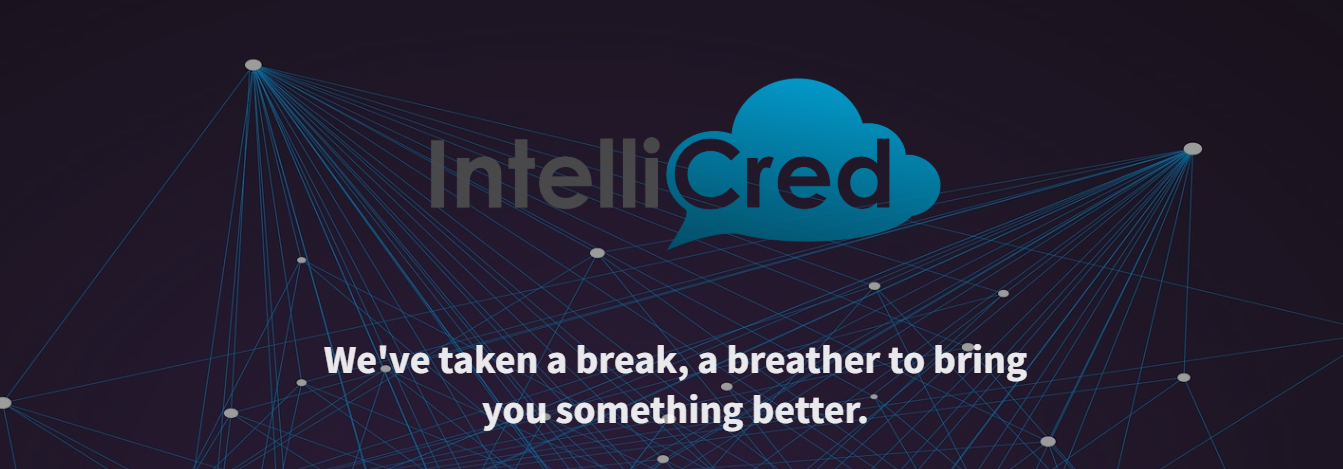

Newport Credentialing has credentialing management software that can make onboarding for the healthcare industry quick and easy. The platform offers analytics via real-time dashboards and KPIs to get a big-picture view of the credentialing lifecycle. The software is designed to assist credentialing experts by maximizing their time and working on enrollments with the highest financial impact.
12. Cure MD – Award-Winning Medical Credentialing Services
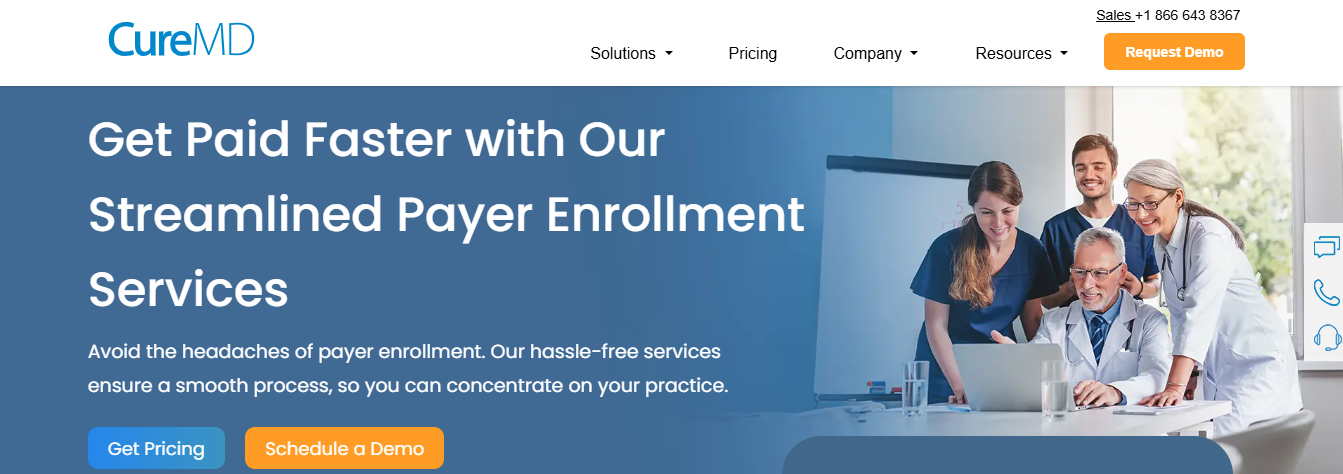

CureMD is an award-winning health information systems and services provider in the robust health IT industry. It was established in 1997 and maintains its Greater New York Area headquarters. Since then, it has served over 30,000 practices with its innovative specialty EHR systems and advanced medical billing solutions. With a long list of accolades to account for, CureMD is a worthwhile mention in our ‘best medical credentialing companies’ listicle.
Its customized medical credentialing service includes enrollment in government programs, enlisting with commercial insurance companies, essential registrations like NPI registration, creation of CAQH and PECOS profiles, management of licenses/ certifications/ affiliations, and continued support for re-credentialing.
13. Credentialing Agent – Keeping Track of Provider Credentialing
Credential Agent stores your team’s credentialing information in an easy-to-see format and helps you keep employee or vendor credentials up to date. You can create a customized schedule that reminds you when to renew a specific credential and receive an automated email, 90, 60, 30, or even one day before the expiration. These alerts can be sent directly to the employee, human resources manager, and anyone relevant. You can also run reports to see what certifications will expire soon and take action accordingly.
14. Practolytics – Credentialing Solutions with Transparent Reporting
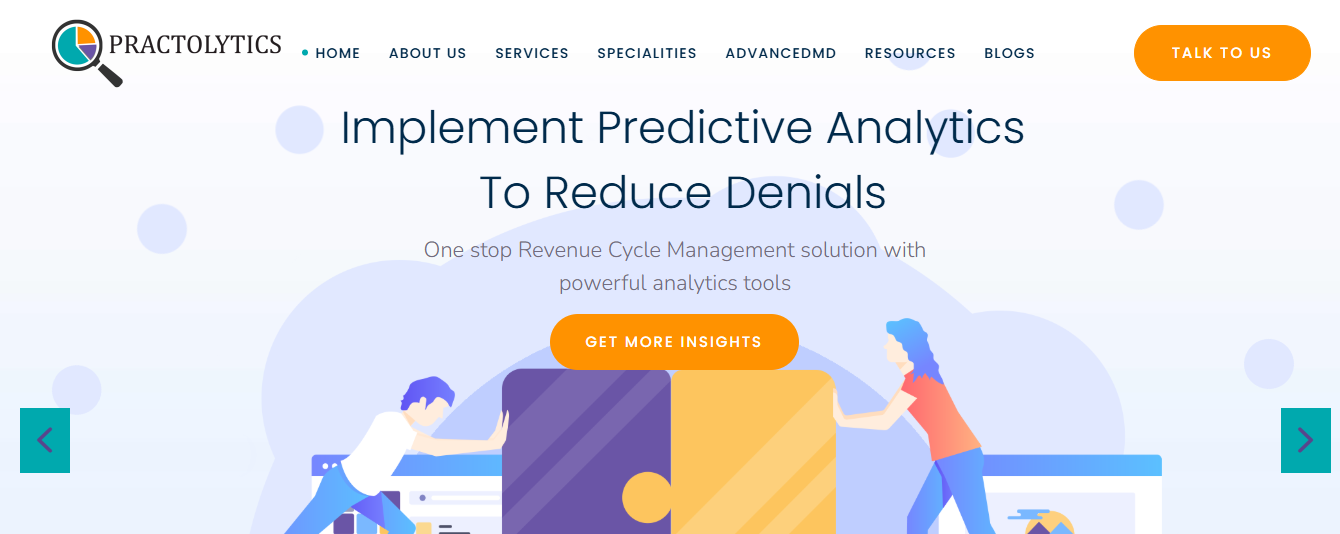

With a mission to provide high-quality revenue cycle management solutions to a range of healthcare practices at competitive prices, Practolytics is transforming the medical billing sector. It caters to more than 28 specialties and has partnered with over 1,400 active providers to ensure rapid reimbursements for the continuation of quality healthcare.
Along with an array of medical billing and practice management solutions, it offers credentialing services to healthcare providers. The real benefit of choosing Practolytics as your credentialing partner is that it delivers bi-monthly reports on the progress of your application, saving you from unnecessary stress.
15. IntelliCred – Credentialing Software Made Easy

IntelliCred from IntelliSoftGroup is dedicated to being an easy-to-implement software credentialing system that helps you manage primary source verification and credentialing. The software group offers access to data consultants who help clients migrate from one platform to IntelliCred. The platform lets you gather, store, and access the data necessary to maintain accreditation. The system can manage workflow actions and provider data for multiple facilities and units, even if the credentialing and verification regulations may differ.
Related Reading
- Behavioral Health Credentialing Checklist
- Dentist Credentialing Checklist
- How to Do Credentialing in Healthcare
- Nurse Practitioner Credentialing Checklist
- Physician Credentialing Services Cost
Types of Healthcare Credentialing


Credentialing Medical Providers: Safeguarding Patient Safety First
Medical providers (physicians, surgeons, etc.) are at the forefront. You’ll find that physicians and surgeons undergo some of the most rigorous credentialing processes in the industry. This process involves verifying education, training, residency, licenses, certifications, and fellowships. The primary goal of credentialing medical providers is to ensure patient safety and maintain high standards of care. This process typically includes:
- Verification of medical education and training
- Confirmation of board certifications
- Review of malpractice history
- Checking state medical licenses
It’s not just about initial credentialing, though. Hospitals and healthcare systems continuously monitor their providers’ credentials, ensuring they stay up-to-date with the latest requirements and maintain their professional qualifications.
Credentialing Nurses and Nurse Practitioners: Protecting Patients Through Comprehensive Validation
Nurses and nurse practitioners undergo rigorous verification processes to validate their education, licensure, and clinical competencies. The process is even more comprehensive for nurse practitioners, often including specialized certifications and advanced degrees. The nurse credentialing process typically involves:
- Verification of nursing degrees and specialized certifications
- Confirmation of state licensure and any disciplinary actions
- Review of clinical experience and continuing education credits
- Background checks and professional references
Likewise, ongoing monitoring is essential to maintain compliance and identify changes in licensure status or disciplinary actions. This continuous process helps healthcare organizations:
- Ensure nurses maintain current licenses and certifications
- Quickly respond to any reported incidents or violations
- Maintain compliance with regulatory requirements
Credentialing Allied Health Professionals: Diverse Paths to Quality Patient Care
This diverse group includes physical therapists, occupational therapists, speech-language pathologists, and others who play vital roles in patient care. The credentialing process for allied health professionals is as diverse as their specialties. Each field has unique requirements that reflect the specific skills and knowledge needed for that profession.
For instance, physical therapists must complete a doctoral program and pass a national licensure exam, while medical laboratory technicians typically need an associate’s degree and certification. One common thread among these is the focus on patient safety and quality care. Professionals must regularly renew their credentials, complete continuing education, and stay current with industry standards.
Book a Call to Learn More About Our Provider Credentialing Services
Azulity’s healthcare credentialing software streamlines the arduous process of verifying healthcare providers’ qualifications, certifications, and work history. This software aims to automate and optimize credentialing to reduce the time it takes to complete so that healthcare organizations can onboard new providers faster.
Azulity’s credentialing solution centralizes and organizes provider data to improve accuracy and eliminate redundancies. The software also includes enrollment features to help healthcare organizations quickly get newly credentialed providers in-network with payers, so they can begin seeing patients without delays.
